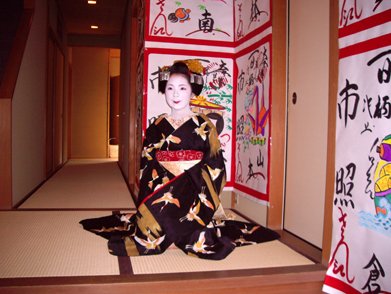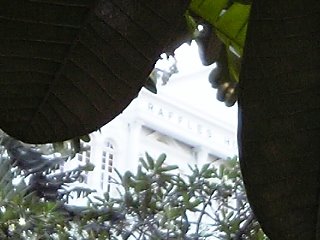
A translation of a blog being maintained by maiko, trainee geisha.

...even a successful war against Iraq will require a U.S. occupation of undetermined length, at undetermined cost, with undetermined consequences. I know that an invasion of Iraq without a clear rationale and without strong international support will only fan the flames of the Middle East, and encourage the worst, rather than best, impulses of the Arab world, and strengthen the recruitment arm of al-Qaeda.Does building a broad, non-partisan centrist bid for the US presidency have to just mean schmoozing Rupert Murdoch? Or can it mean doing something more exciting? This election in 2008 is very important and I would hate to see the Democrats getting carried away with some pet project, only to find America is not like what they want it to be, but, looking at Obama, I get a growing feeling that Hillary Clinton and Senator John Edwards, a Clintonesque politician and my previous favourite, are blasts from the past. Barack Obama has a couple of rather insignificant skeletons which he seems to be happy to take out of the closet and be honest about (experimenting with drugs and a small property deal with a shady developer).
More.







Sir, – In his review of Kate Teltscher’s The High Road to China (October 27) Bernard Porter refers to the well-known saying “the exception that proves the rule” and says, “I’ve never entirely understood that expression”. He is in the majority; few people do.When the word “prove” entered our language it came, via the French, from the Latin “probare”, meaning to test or try (put on trial) and carried the meaning of the original. This meaning survives now only in the usual locations for obsolete expressions, such as trade terms, proverbs, and closely defined expressions in, for example, religion, philosophy and law.
Thus, a printer’s “proof” copy is his “trial” copy, and the “proof of the pudding is in the eating” means that the only way to “test” a pudding is to eat it. In English law a case goes to “trial”: in Scots law a case goes to “proof”; the two words mean exactly the same. This, incidentally, also explains another universally misunderstood usage, the Scots verdict of “not proven”, which does not mean “not proved”, but “case not tried”, for if the burden of evidence is insufficient to reach a decisive verdict, the case is not concluded, and is therefore not “tried”, i.e. not proven.
This too is why the “not proven” verdict could mean the reopening of the case, whereas the other two verdicts closed the matter. Thus, “the exception proves the rule” simplifies to the obvious: you have a rule, up comes an exception, and that rule is immediately put on trial.
J. I. ANDERSON
Edinburgh.


Magnum opus. Champagne magnum. Bullet (Magnum). Bloody mess.


Cech faces a lengthy spell on the sidelines after undergoing surgery on a depressed fracture of his skull.
Cudicini was also concussed and carried off during the match but was released from hospital later on Saturday.
The Italian, however, is doubtful for Wednesday's Champions League home tie against Barcelona and Chelsea are likely to turn to third choice keeper Hilario.

















"If the Vatican says something dumb about Muslims, people will die in parts of Africa and churches will be burned in Indonesia..." Father Thomas Reese, April 2006.Apparently, the Pope has provoked "anger among Muslims" by saying Muhammad has brought the world only "evil and inhuman" things. Hmmm. The Pope's speech (full text here) does quote a Byzantine emperor saying that. I don't know why because it is quite tangential to the theme.











My first exposure to murder occurred when I was 11. This was in 1944, in the communal riots that characterised the last years of the British Raj, which ended in 1947. I saw a profusely bleeding unknown person suddenly stumbling through the gate to our garden, asking for help and a little water. I shouted for my parents, while fetching some water for him. My father rushed him to the hospital, but he died there of his injuries. His name was Kader Mia.
The Hindu-Muslim riots that preceded independence also led the way to the partition of the country into India and Pakistan. The carnage erupted with dramatic suddenness, and it did not spare normally peaceful Bengal. Kader Mia was killed in Dhaka, then the second city (after Calcutta) of undivided Bengal, and which would become, after the partition, the capital of East Pakistan. My father taught at Dhaka University, and we lived in an area called Wari in old Dhaka, not far from the university, in what happened to be a largely Hindu area. Kader Mia was a Muslim, and no other identity was relevant for the vicious Hindu thugs who pounced on him. In that day of rioting, hundreds of Muslims and Hindus were killed by each other, and this would continue to happen day after day.
...
Over 60 years after Kader Mia's death, as I try to recollect the deadly Hindu-Muslim riots in the 1940s, it is hard to convince myself that those terrible things did actually happen. But even though the communal riots in Bengal were entirely transitory and ephemeral (and the few cases in which riots have been fostered later on in other parts of India do not compare in size and reach with the events of the 1940s), they left in their wake thousands upon thousands of dead Hindus and Muslims. The political instigators who urged the killing (on behalf of what they called "our people") managed to persuade many otherwise peaceable people of both communities to turn into dedicated thugs. They were made to think of themselves only as Hindus or only as Muslims (who must unleash vengeance on "the other community") and as absolutely nothing else: not Indians, not subcontinentals, not Asians, not members of a shared human race.
Even though the vast majority of both communities did not think in those narrowly frenzied terms, too many were suddenly trapped into that vicious mode of thinking, and the more savage among them - often at the troubled ends of each community - were induced to kill "the enemies who kill us" (as they were respectively defined). Many-sided persons were seen, through the hazy lenses of sectarian singularity as having exactly one identity each, linked with religion or, more exactly, religious ethnicity (since being a non-practitioner of one's inherited religion would not give a person any immunity whatever from being attacked).
...
THE CULTIVATION OF VIOLENCE
Sectarian violence across the world today is no less crude, nor less reductionist, than it was 60 years ago. Underlying the coarse brutality, there is also a big conceptual confusion about people's identities, which turns multidimensional human beings into one-dimensional creatures.
Hating people is not easy. Ogden Nash's poem "Plea for Less Malice Toward None" got this just right: "Any kiddie in school can love like a fool,/But hating, my boy, is an art." How does this "art" work? The illusion of singular identity is skilfully cultivated and fomented by the commanders of persecution and carnage. It is not remarkable that generating this illusion would appeal to those who are in the business of fomenting violence. But there is a big question about why the cultivation of singularity is so successful. To see a person exclusively in terms of only one of his or her many identities is a deeply crude intellectual move, and yet, judging from its effectiveness, it is evidently easy to champion and promote.
The martial art of fostering violence draws on some basic instincts and uses them to crowd out the freedom to think and the possibility of composed reasoning. But it also draws on a kind of logic - a fragmentary logic. The specific identity that is separated out for special action is, in most cases, a genuine identity of the person to be recruited: a Hutu is indeed a Hutu, a "Tamil tiger" is clearly a Tamil, a Serb is not an Albanian, and a Gentile German with a mind poisoned by Nazi philosophy is certainly a Gentile German. What is done to turn that sense of self-understanding into a murderous instrument is (1) to ignore the relevance of all other affil iations and associations, and (2) to redefine the demands of the "sole" identity in a particularly belligerent form. This is where the nastiness as well as the conceptual confusions are made to creep in.
THE LOW EDGE OF HIGH THEORY
Forcing people into boxes of singular identity is a feature also of many of the high theories of cultures and civilisations that are quite influential right now. These theories do not advocate or condone violence - far from it. However, they try to understand human beings not as persons with diverse identities but predominantly as members of one particular social group or community.
For example, civilisational classifiers have often pigeonholed India as a "Hindu civilisation" - a description that, among other things, pays little attention to India's more than 145 million Muslims (not to mention Indian Sikhs, Jains, Christians, Parsees and others), and also ignores the extensive interconnections among the people of the country that do not work through religion at all, but through political, social, economic, commercial, artistic, musical or other cultural activities. In a less straightforward way, the powerful school of communitarian thinking also hallows exactly one identity per human being, based on community membership, and in effect downplays all other affiliations that make human beings the complex and intricate social creatures that we are.





It was widely believed by the devout of those days that unbelievers would scream for a priest when their own death-beds loomed...Dying in ulcerated agony, he was imposed upon by two Presbyterian ministers who pushed past his housekeeper and urged him to avoid damnation by accepting Jesus Christ. "Let me have none of your Popish stuff," Paine responded. "Get away with you, good morning, good morning." The same demand was made of him as his eyes were closing. "Do you wish to believe that Jesus Christ is the son of God?" He answered quite distinctly: "I have no wish to believe on that subject." Thus he expired with his reason, and his rights, both still staunchly defended until the very last.Eleven years before Paine's death:
In the year 1798, seeking to choke the influence of French and other revolutionary opinions in their own "backyard", the British authorities jailed the radical Irish nationalist Arthur O'Connell. As he was being led away, O'Connell handed out a poem of his own composition that seemed to its readers like a meek act of contrition, and a repudiation of that fount of heresy, Thomas Paine:From Christopher Hitchens.
The pomp of courts and pride of kings
I prize above all earthly things;
I love my country; the king
Above all men his praise I sing:
The royal banners are displayed,
And may success the standard aid.
I fain would banish far from hence,
The Rights of Man and Common Sense;
Confusion to his odious reign,
That foe to princes, Thomas Paine!
Defeat and ruin seize the cause
Of France, its liberties and laws!
If the reader has the patience to take the first line of the first stanza, then the first line of the second stanza, and then repeat the alternating process with the second, third and fourth lines of each, and so on, he or she will have no difficulty in writing out quite a different poem. (How much the British have suffered from their fatuous belief that the Irish are stupid!)

